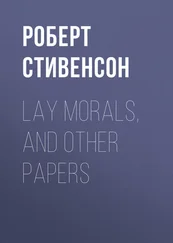Роберт Стивенсон - Virginibus Puerisque, and Other Papers
Здесь есть возможность читать онлайн «Роберт Стивенсон - Virginibus Puerisque, and Other Papers» — ознакомительный отрывок электронной книги совершенно бесплатно, а после прочтения отрывка купить полную версию. В некоторых случаях можно слушать аудио, скачать через торрент в формате fb2 и присутствует краткое содержание. Жанр: literature_19, foreign_antique, foreign_prose, на английском языке. Описание произведения, (предисловие) а так же отзывы посетителей доступны на портале библиотеки ЛибКат.
- Название:Virginibus Puerisque, and Other Papers
- Автор:
- Жанр:
- Год:неизвестен
- ISBN:нет данных
- Рейтинг книги:4 / 5. Голосов: 1
-
Избранное:Добавить в избранное
- Отзывы:
-
Ваша оценка:
- 80
- 1
- 2
- 3
- 4
- 5
Virginibus Puerisque, and Other Papers: краткое содержание, описание и аннотация
Предлагаем к чтению аннотацию, описание, краткое содержание или предисловие (зависит от того, что написал сам автор книги «Virginibus Puerisque, and Other Papers»). Если вы не нашли необходимую информацию о книге — напишите в комментариях, мы постараемся отыскать её.
Virginibus Puerisque, and Other Papers — читать онлайн ознакомительный отрывок
Ниже представлен текст книги, разбитый по страницам. Система сохранения места последней прочитанной страницы, позволяет с удобством читать онлайн бесплатно книгу «Virginibus Puerisque, and Other Papers», без необходимости каждый раз заново искать на чём Вы остановились. Поставьте закладку, и сможете в любой момент перейти на страницу, на которой закончили чтение.
Интервал:
Закладка:
The unfading boyishness of hope and its vigorous irrationality are nowhere better displayed than in questions of conduct. There is a character in the Pilgrim’s Progress , one Mr. Linger-after-Lust with whom I fancy we are all on speaking terms; one famous among the famous for ingenuity of hope up to and beyond the moment of defeat; one who, after eighty years of contrary experience, will believe it possible to continue in the business of piracy and yet avoid the guilt of theft. Every sin is our last; every 1st of January a remarkable turning-point in our career. Any overt act, above all, is felt to be alchemic in its power to change. A drunkard takes the pledge; it will be strange if that does not help him. For how many years did Mr. Pepys continue to make and break his little vows? And yet I have not heard that he was discouraged in the end. By such steps we think to fix a momentary resolution; as a timid fellow hies him to the dentist’s while the tooth is stinging.
But, alas, by planting a stake at the top of flood, you can neither prevent nor delay the inevitable ebb. There is no hocus-pocus in morality; and even the “sanctimonious ceremony” of marriage leaves the man unchanged. This is a hard saying, and has an air of paradox. For there is something in marriage so natural and inviting, that the step has an air of great simplicity and ease; it offers to bury for ever many aching preoccupations; it is to afford us unfailing and familiar company through life; it opens up a smiling prospect of the blest and passive kind of love, rather than the blessing and active; it is approached not only through the delights of courtship, but by a public performance and repeated legal signatures. A man naturally thinks it will go hard with him if he cannot be good and fortunate and happy within such august circumvallations.
And yet there is probably no other act in a man’s life so hot-headed and foolhardy as this one of marriage. For years, let us suppose, you have been making the most indifferent business of your career. Your experience has not, we may dare to say, been more encouraging than Paul’s or Horace’s; like them, you have seen and desired the good that you were not able to accomplish; like them, you have done the evil that you loathed. You have waked at night in a hot or a cold sweat, according to your habit of body, remembering with dismal surprise, your own unpardonable acts and sayings. You have been sometimes tempted to withdraw entirely from this game of life; as a man who makes nothing but misses withdraws from that less dangerous one of billiards. You have fallen back upon the thought that you yourself most sharply smarted for your misdemeanours, or, in the old, plaintive phrase, that you were nobody’s enemy but your own. And then you have been made aware of what was beautiful and amiable, wise and kind, in the other part of your behaviour; and it seemed as if nothing could reconcile the contradiction, as indeed nothing can. If you are a man, you have shut your mouth hard and said nothing; and if you are only a man in the making, you have recognised that yours was quite a special case, and you yourself not guilty of your own pestiferous career.
Granted, and with all my heart. Let us accept these apologies; let us agree that you are nobody’s enemy but your own; let us agree that you are a sort of moral cripple, impotent for good; and let us regard you with the unmingled pity due to such a fate. But there is one thing to which, on these terms, we can never agree: – we can never agree to have you marry. What! you have had one life to manage, and have failed so strangely, and now can see nothing wiser than to conjoin with it the management of some one else’s? Because you have been unfaithful in a very little, you propose yourself to be a ruler over ten cities. You strip yourself by such a step of all remaining consolations and excuses. You are no longer content to be your own enemy; you must be your wife’s also. You have been hitherto in a mere subaltern attitude; dealing cruel blows about you in life, yet only half responsible, since you came there by no choice or movement of your own. Now, it appears, you must take things on your own authority: God made you, but you marry yourself; and for all that your wife suffers, no one is responsible but you. A man must be very certain of his knowledge ere he undertake to guide a ticket-of-leave man through a dangerous pass; you have eternally missed your way in life, with consequences that you still deplore, and yet you masterfully seize your wife’s hand, and, blindfold, drag her after you to ruin. And it is your wife, you observe, whom you select. She, whose happiness you most desire, you choose to be your victim. You would earnestly warn her from a tottering bridge or bad investment. If she were to marry some one else, how you would tremble for her fate! If she were only your sister, and you thought half as much of her, how doubtfully would you entrust her future to a man no better than yourself!
Times are changed with him who marries; there are no more by-path meadows, where you may innocently linger, but the road lies long and straight and dusty to the grave. Idleness, which is often becoming and even wise in the bachelor, begins to wear a different aspect when you have a wife to support. Suppose, after you are married, one of those little slips were to befall you. What happened last November might surely happen February next. They may have annoyed you at the time, because they were not what you had meant; but how will they annoy you in the future, and how will they shake the fabric of your wife’s confidence and peace! A thousand things unpleasing went on in the chiaroscuro of a life that you shrank from too particularly realising; you did not care, in those days, to make a fetish of your conscience; you would recognise your failures with a nod, and so, good day. But the time for these reserves is over. You have wilfully introduced a witness into your life, the scene of these defeats, and can no longer close the mind’s eye upon uncomely passages, but must stand up straight and put a name upon your actions. And your witness is not only the judge, but the victim of your sins; not only can she condemn you to the sharpest penalties, but she must herself share feelingly in their endurance. And observe, once more, with what temerity you have chosen precisely her to be your spy, whose esteem you value highest, and whom you have already taught to think you better than you are. You may think you had a conscience, and believed in God; but what is a conscience to a wife? Wise men of yore erected statues of their deities, and consciously performed their part in life before those marble eyes. A god watched them at the board, and stood by their bedside in the morning when they woke; and all about their ancient cities, where they bought and sold, or where they piped and wrestled, there would stand some symbol of the things that are outside of man. These were lessons, delivered in the quiet dialect of art, which told their story faithfully, but gently. It is the same lesson, if you will – but how harrowingly taught! – when the woman you respect shall weep from your unkindness or blush with shame at your misconduct. Poor girls in Italy turn their painted Madonnas to the wall: you cannot set aside your wife. To marry is to domesticate the Recording Angel. Once you are married, there is nothing left for you, not even suicide, but to be good.
And goodness in marriage is a more intricate problem than mere single virtue; for in marriage there are two ideals to be realised. A girl, it is true, has always lived in a glass house among reproving relatives, whose word was law; she has been bred up to sacrifice her judgments and take the key submissively from dear papa; and it is wonderful how swiftly she can change her tune into the husband’s. Her morality has been, too often, an affair of precept and conformity. But in the case of a bachelor who has enjoyed some measure both of privacy and freedom, his moral judgments have been passed in some accordance with his nature. His sins were always sins in his own sight; he could then only sin when he did some act against his clear conviction; the light that he walked by was obscure, but it was single. Now, when two people of any grit and spirit put their fortunes into one, there succeeds to this comparative certainty a huge welter of competing jurisdictions. It no longer matters so much how life appears to one; one must consult another: one, who may be strong, must not offend the other, who is weak. The only weak brother I am willing to consider is (to make a bull for once) my wife. For her, and for her only, I must waive my righteous judgments, and go crookedly about my life. How, then, in such an atmosphere of compromise, to keep honour bright and abstain from base capitulations? How are you to put aside love’s pleadings? How are you, the apostle of laxity, to turn suddenly about into the rabbi of precision; and after these years of ragged practice, pose for a hero to the lackey who has found you out? In this temptation to mutual indulgence lies the particular peril to morality in married life. Daily they drop a little lower from the first ideal, and for a while continue to accept these changelings with a gross complacency. At last Love wakes and looks about him; finds his hero sunk into a stout old brute, intent on brandy pawnee; finds his heroine divested of her angel brightness; and in the flash of that first disenchantment, flees for ever.
Читать дальшеИнтервал:
Закладка:
Похожие книги на «Virginibus Puerisque, and Other Papers»
Представляем Вашему вниманию похожие книги на «Virginibus Puerisque, and Other Papers» списком для выбора. Мы отобрали схожую по названию и смыслу литературу в надежде предоставить читателям больше вариантов отыскать новые, интересные, ещё непрочитанные произведения.
Обсуждение, отзывы о книге «Virginibus Puerisque, and Other Papers» и просто собственные мнения читателей. Оставьте ваши комментарии, напишите, что Вы думаете о произведении, его смысле или главных героях. Укажите что конкретно понравилось, а что нет, и почему Вы так считаете.












